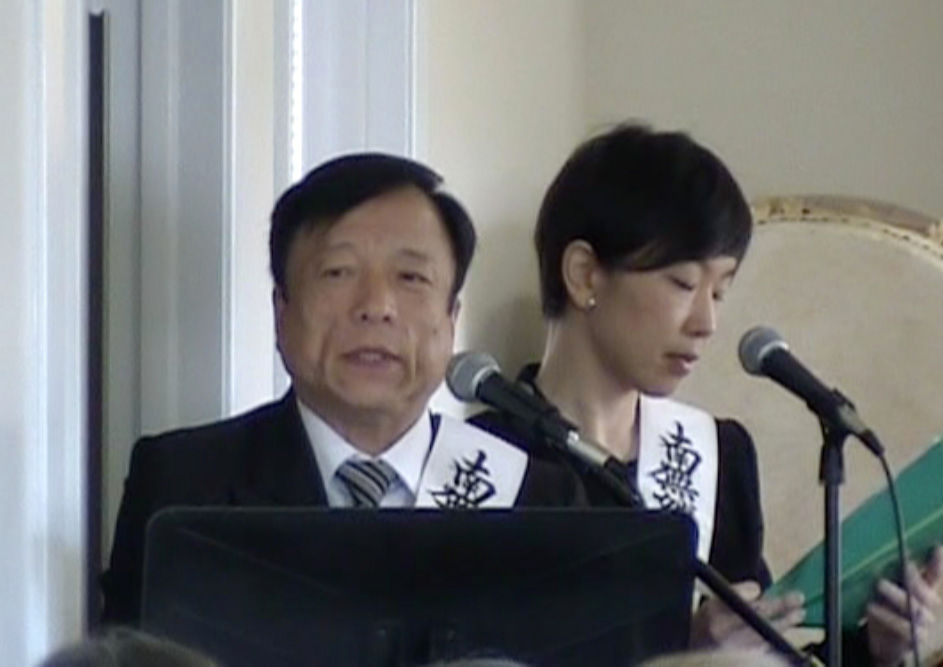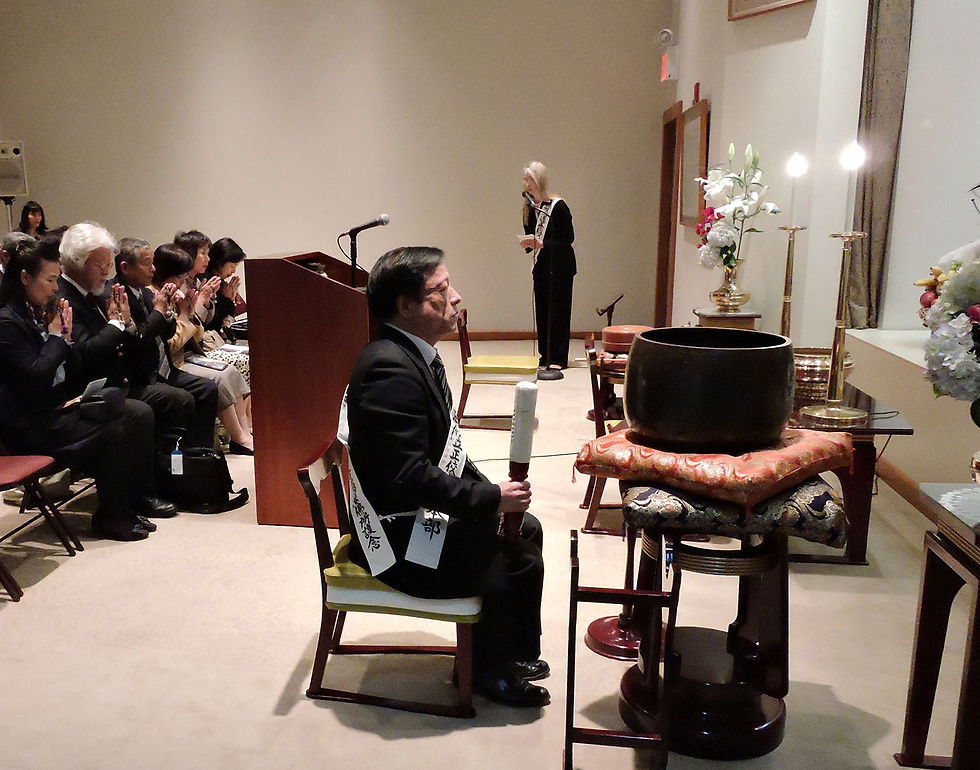Spiritual Journey: Taking Everyone’s Joy as My Own-Mr. Masayoshi Imura
- RKINA
- Jun 30, 2025
- 6 min read
Updated: Jul 3, 2025
by Mr. Masayoshi Imura
New York Dharma Center, USA

This spiritual journey was delivered during the Ceremony of the Anniversary of Shakyamuni’s birth at the Chicago Chapter, New York Dharma Center, on April 19, 2015.
I deeply appreciate this opportunity to speak of my spiritual experience at today’s ceremony commemorating the Anniversary of Shakyamuni’s birth.
I practice at the New York Dharma Center, which is part of the New York Chapter. For a long time, I had been the head of New York Dharma Center’s General Affairs Group. Last year, I handed over my role to a younger person, and now I have the very important role of Director of the New York Dharma Center.
I was born in 1948 in Tokyo. My mother became a member of Rissho Kosei-kai, and I grew up as a second-generation member in this faith. I remember that my mother never imposed her faith on me, but I recall that the teaching was a natural, real part of daily life.
Around the time I graduated from university, I began to visit the Dharma center, and was assigned the role of head of the youth group in my Chapter. I was so young that I didn't fully understand the teachings, but I took care of junior members of the youth group and responded to requests for advice about whatever was worrying or concerning them. We did activities at night and on holidays. When the members gathered, we began with sutra recitation, followed by the hoza activity. Our discussions went quite well. In summer, we had good times going to the sea or the mountains for recreation. The teaching was the pillar of our activities, and we felt the real joy of moving toward one purpose, together with the members.
When I was twenty-seven years old, I was busy with my work, and I gradually moved away from the activities of the youth group. When I was thirty years old, I had a desire to leave Japan and explore the world; my enthusiasm for this goal helped me travel alone to Canada. It was the first time I ever set foot on the American Continent. I had no friends there, and I acted out of youthful impulse. Thereafter, I moved from Canada to New York, relying on my friend. Looking back, I can see that I experienced a series of twists and turns in my life in America. Amazingly, I had been blessed with encounters with good people, and I could manage to earn a living.
When I was young, I used to participate in the activities of the Dharma center in Tokyo, although I knew very little about the teachings. But what I had learned there must have somehow penetrated within me. I knew that there was a Dharma center in New York, so I started visiting it. I sought the teachings, and Rev. Kamoshita, the former minister, showed me a great deal of compassion and understanding. I had been liberated both in mind and body. I am still filled with appreciation for her. Currently, thanks to her guidance, I am able to lead a life each day that allows me to fulfill my role.
It is a lifetime issue for a Buddhist to practice the teachings.
I’m making an effort every day to walk the path of becoming a buddha, according to the teachings.
Now I have the role of taking care of some members in the New York Chapter. Today, I would like to report the virtue of my mind through the tedori supporting members in the Dharma. (Tedori is the practice of connecting others to the Dharma.)
The other day, a member, temporarily referred to Ms. A (who I had always cared about) visited the Dharma center. Although she had come to the center, she had almost never sat in the hoza circle until this time. The minister asked her to participate in the hoza if she was all right, and so she sat in the hoza. In the hoza, Ms. A started to talk about what was on her mind. She had a problem. Saying, “I did not intend to talk like this today, but can I continue to talk about myself?” she continued speaking in a burst of words. After briefly telling her story, while communicating with the minister, Ms. A thought deeply about each matter that arose, confirming that she herself might have the cause of the problem.

Ms. A’s problem was a conflict with her younger sister, who was living in Japan. Ms. A and her sister had had a good relationship, but due to some trouble, a strife arose between them. After listening attentively to the details, the minister asked Ms. A how she would like the situation to be. She immediately replied, “I would like to have a good relationship with her, as it used to be.” The minister answered, “It will be all right if you have such a viewpoint. Let’s start to study the Buddha’s teachings from now on.” Probably because she was finally able to talk about her problem, she looked better when she returned home that day. Until that time, Ms. A refused to receive Rissho Kosei-kai’s monthly magazine, Kosei, and weekly newspaper, the Kosei Shimbun, because they were sent to her from Japan. However, I asked her to take the January and February issues of the magazine, as well as the current issue of the newspaper, with her when she returned home.
A week had passed, and I was so worried about Ms. A. I called her and asked how she was doing. She was doing fine, and she cheerfully told me about how she had been. She said, “Mr. Imura, I have never read the Kosei magazine earnestly, but I read the January issue of the Kosei magazine in one sitting after returning home. What moved me most was the President’s Guidance. While reading it, what I learned in the hoza the other day kept going through my mind. The president’s words were so apt for my current situation that I was surprised; I was truly filled with wonder. His words, which had deeply touched me, were “kind words.” I learned what it means to use kind words when I talk to people, and I was absolutely enthralled by the president’s words,” said Ms. A with feeling.
I repeated her words, “Oh, really? Are you absolutely enthralled by the words in the President’s Guidance? That’s amazing!” Then she replied, “Oh, I could reflect on myself deeply that the cause of all my troubles was in me, not in the other.” I only repeated the words, “Great! Great!” Listening to her talk, I felt my mind also purified.
After hanging up the phone, I immediately read the President’s Guidance in the January issue of the Kosei magazine over again. “Kind words” is one of the seven types of non-material donations, and it is the kind of generosity that doesn’t require spending any money. Regarding the seven types of nonmaterial donations that can be made within the family, the President notes, “A cheerful face, a friendly look, and kind words are particularly important.”
In the previous hoza session, Ms. A stated that she was experiencing a problem. However, I understood that she was able to reflect on herself through the President's words and thought about how she had attributed her suffering to her arrogant mind, without blaming anyone else. At the same time, her problem seems to be on the way to resolution. I just took the part of a listener, nodding my head, and I listened to her talk attentively. But I could feel her rejoicing, and I found myself filled with joy, as if it were my own.
Now I have realized that my soul is made purer and more joyful through my encounter with Ms. A. Her joy becomes my own. I felt what a pure impression the joy of the soul had made on me, and the joy of living welled up in my heart. Frankly speaking, I had never experienced such a practice of tedori, or supporting members in the Dharma. I have come to deeply appreciate the joy of practicing tedori. Today, we observe the Ceremony of the Anniversary of Shakyamuni’s birth. We are able to encounter the Buddha Dharma by the grace of Shakyamuni’s birth, and we can encounter the Buddha Dharma by the grace of the Founder, who presented the teachings in an easy-to-understand manner to us living in this age. I would like to continue to spend my days taking everyone’s joy as my own. Everyone, thank you very much.




Comments